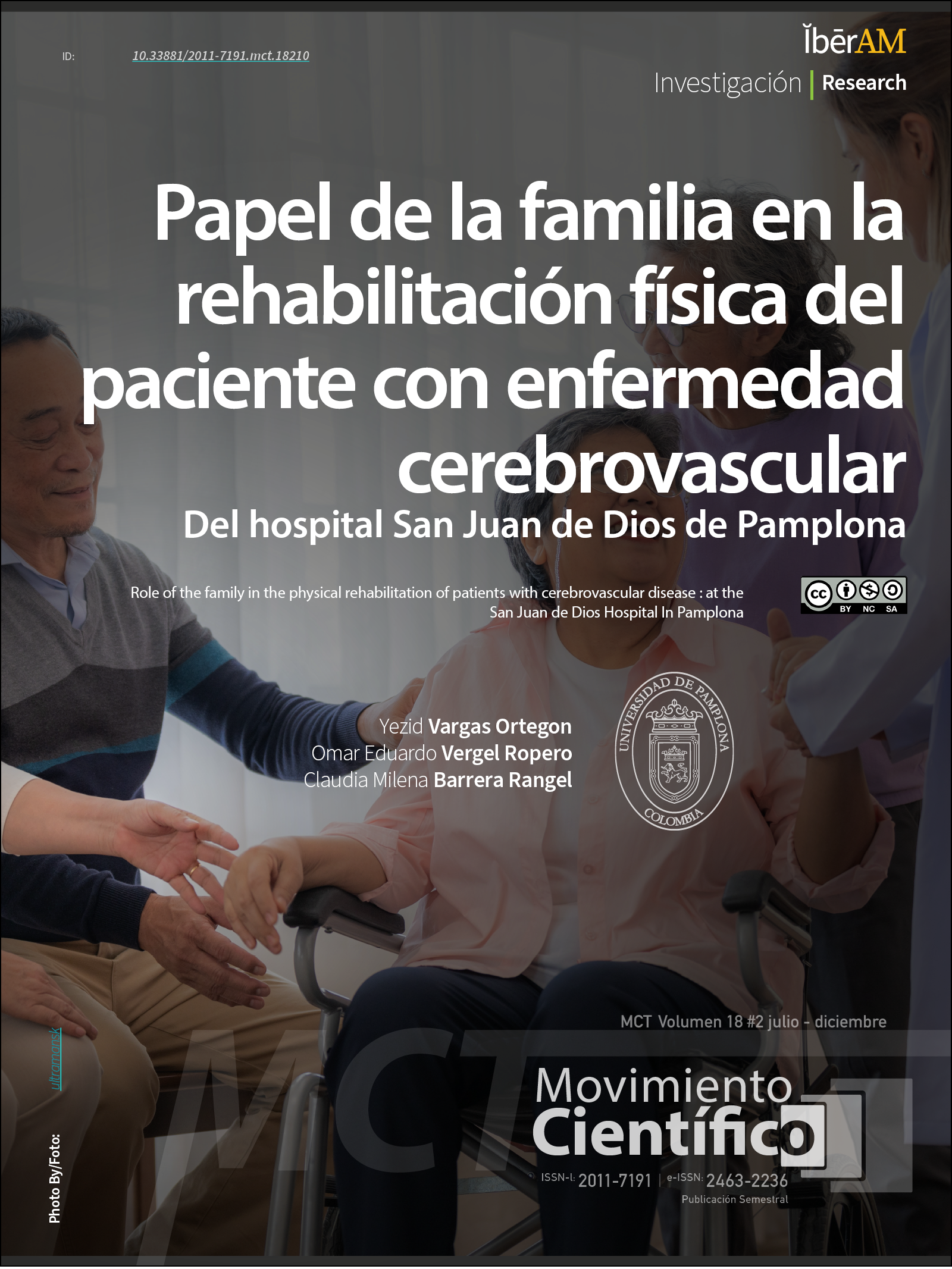The role of the family in the physical rehabilitation of patients with cerebrovascular disease at the San Juan de Dios Hospital in Pamplona
Papel de la familia en la rehabilitación física del paciente con enfermedad cerebrovascular del Hospital San Juan de dios de Pamplona
Main Article Content
Introduction: Cerebrovascular disease (CVD) has become one of the most frequent pathologies in members of Colombian families, generating high mortality percentages, as well as one of the greatest causes of disability in adults. For this reason, the support of the family is of great importance for the care and rehabilitation of the patient. Objective: To determine the role of the family in the physical rehabilitation of patients with cerebrovascular disease at the San Juan de Dios Hospital in Pamplona. Methodology: A mixed research design was carried out with a sample of 7 patients who were in the process of rehabilitation for cerebrovascular disease and their respective main caregivers, using a questionnaire distributed in closed questions on sociodemographic characterization and a semi-structured interview that allowed describing family support in the patient's rehabilitation. Results: The caregivers and patients are from socioeconomic stratum 1 and 2, from the urban area, with an educational level between primary and high school, dedication as a housewife, with a marital status between singleness and free union. In gender and age, it was evident that caregivers are women between 29 and 59 years old. And in relation to patients, it was found that 100% are over 60 years of age, most of them being female. In relation to family care, it can be described that family integration is important in the patient's rehabilitation, recognizing union, love, effort and dedication as fundamental pillars of these practices. Conclusion: The integration of the family in support of the activities of the physiotherapist is essential for the rapid and effective achievement of the patient's rehabilitation.
Downloads
Publication Facts
Reviewer profiles N/A
Author statements
Indexed in
-
—
- Academic society
- N/A
- Publisher
- Bogotá: Corporación Universitaria Iberoamericana
Article Details
Arteaga, M., Campos, A., y Roldan S. (2019). Apoyo familiar en la recuperación de la salud de pacientes adultos mayores con secuelas de ECV (evento cerebro vascular)”. https://www.eumed.net/rev/caribe/2019/07/apoyo-familiar-pacientes.html.
Bautista, N. (2021). Enfermedad cerebrovascular, otra comorbilidad priorizada contra el covid-19. https://www.minsalud.gov.co/Paginas/Enfermedad-cerebrovascular,-otra-comorbilidad-priorizada-contra-el-covid-19.aspx.
Bo Zhou et al. (2019). Rehabilitación de accidentes cerebrovasculares proporcionada por cuidadores en zonas rurales de China del ensayo controlado aleatorizado RECOVERA. https://www.ahajournals.org/doi/suppl/10.1161/STROKEAHA.118.021558.
Cameron (2021). El cuidado familiar: reflexionar sobre el pasado para informar el futuro. https://www.tandfonline.com/doi/full/10.1080/10790268.2021.1970883.
Da Silva J., Ferraz K., Pereira, J., Oliveira D., & Oliveira R. (2020). Necesidades de los cuidadores familiares de sobrevivientes de Accidente Cerebrovascular. Investigación y Educación en Enfermería. https://revistas.udea.edu.co/index.php/iee/article/view/344386.
Dharma y Rahayu. (2020). El efectivo modelo de comportamiento de adaptación postapoplejía requiere un sistema de apoyo familiar. https://www-sciencedirect-com.unipamplona.basesdedatosezproxy.com/science/article/pii/S2445147922000273#bib0120.
Franco, S. (2020). Teorías y modelos en Fisioterapia en Neurofacilitación. https://libros.usc.edu.co/index.php/usc/catalog/download/145/185/2625?inline=1 DOI: https://doi.org/10.35985/9789585583535.3
Ministerio de Salud de Colombia. (1993). Resolución número 8430 de 1993, Bogotá, Colombia. https://www.minsalud.gov.co/sites/rid/Lists/BibliotecaDigital/RIDE/DE/DIJ/RESOLUCION-8430-DE-1993.PDF
Ministerio de Salud de Colombia. (2020). Conozca cómo prevenir los accidentes cerebrovasculares. https://www.minsalud.gov.co/Paginas/Conozca-como-prevenir-los-accidentes-cerebrovasculares.aspx.
Organización Panamericana de la Salud. (2021). La carga de las enfermedades cardiovasculares en la Región de las Américas, 2000-2019. Portal de Datos de NMH. https://www.paho.org/es/enlace/carga-enfermedades-cardiovasculares.
Pérez, S. (2022). Percepciones de recuperación y rehabilitación en personas con daño cerebral en España. Un estudio cualitativo. https://pubmed.ncbi.nlm.nih.gov/35289029/.
Silva y Boery (2021). Cuidadores familiares de sobrevivientes de accidente cerebrovascular: sobrecarga y factores relacionados. https://www.scielo.cl/scielo.php?pid=S0717-95532021000100208&script=sci_abstract
Tseung, V, et al. (2019). Implementación de programas de apoyo a los cuidadores en un sistema regional de ictus. https://www.ahajournals.org/doi/10.1161/STROKEAHA.119.026660.














